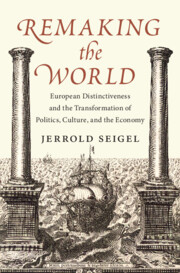 Remaking the World
Remaking the World 1 - Introduction
Published online by Cambridge University Press: 29 November 2024
Summary
Marx summed up Europe’s many impacts on world history as showing “what human activity can bring about” – namely, the capacity to undo and remake the human world. Although we have become increasingly aware of the negative side of this release of human energies, in war, ecological destruction, and imperial domination, the positive one survives in the closer contact between peoples, modern industry’s potential to reduce poverty, and the expansion of practical knowledge and scientific understanding. Remaking the World argues that what put Europe at the center of these changes was first the division and fragmentation that persisted through much of its history and then the emergence of spheres of activity that were autonomous in the sense of regulating themselves by principles derived from the activities carried on within them, as opposed to “teleocratic” domains governed by norms that were generated outside themselves. Unlike other attempts to grasp European distinctiveness which focus chiefly on economics and industry, it gives equal attention to culture, science, and the politics of liberty, and makes comparisons based on substantial discussions of counterparts to these developments elsewhere.
Information
- Type
- Chapter
- Information
- Remaking the WorldEuropean Distinctiveness and the Transformation of Politics, Culture, and the Economy, pp. 1 - 14Publisher: Cambridge University PressPrint publication year: 2024